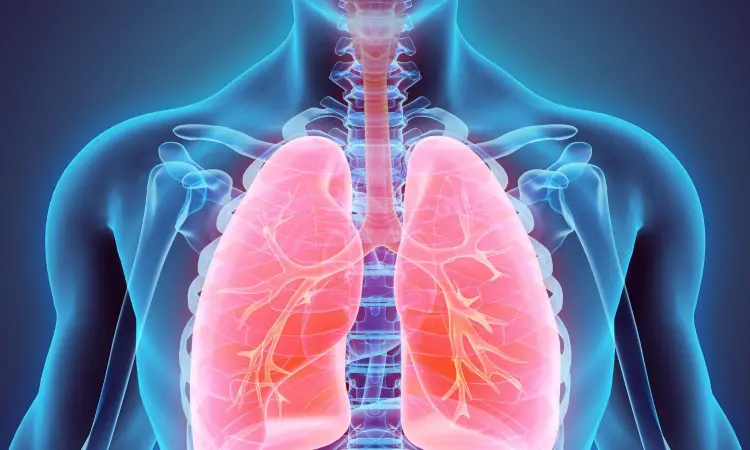- Home
- Medical news & Guidelines
- Anesthesiology
- Cardiology and CTVS
- Critical Care
- Dentistry
- Dermatology
- Diabetes and Endocrinology
- ENT
- Gastroenterology
- Medicine
- Nephrology
- Neurology
- Obstretics-Gynaecology
- Oncology
- Ophthalmology
- Orthopaedics
- Pediatrics-Neonatology
- Psychiatry
- Pulmonology
- Radiology
- Surgery
- Urology
- Laboratory Medicine
- Diet
- Nursing
- Paramedical
- Physiotherapy
- Health news
- Fact Check
- Bone Health Fact Check
- Brain Health Fact Check
- Cancer Related Fact Check
- Child Care Fact Check
- Dental and oral health fact check
- Diabetes and metabolic health fact check
- Diet and Nutrition Fact Check
- Eye and ENT Care Fact Check
- Fitness fact check
- Gut health fact check
- Heart health fact check
- Kidney health fact check
- Medical education fact check
- Men's health fact check
- Respiratory fact check
- Skin and hair care fact check
- Vaccine and Immunization fact check
- Women's health fact check
- AYUSH
- State News
- Andaman and Nicobar Islands
- Andhra Pradesh
- Arunachal Pradesh
- Assam
- Bihar
- Chandigarh
- Chattisgarh
- Dadra and Nagar Haveli
- Daman and Diu
- Delhi
- Goa
- Gujarat
- Haryana
- Himachal Pradesh
- Jammu & Kashmir
- Jharkhand
- Karnataka
- Kerala
- Ladakh
- Lakshadweep
- Madhya Pradesh
- Maharashtra
- Manipur
- Meghalaya
- Mizoram
- Nagaland
- Odisha
- Puducherry
- Punjab
- Rajasthan
- Sikkim
- Tamil Nadu
- Telangana
- Tripura
- Uttar Pradesh
- Uttrakhand
- West Bengal
- Medical Education
- Industry
Serum Rcn3 level helpful for diagnosis of connective tissue disease-associated interstitial lung disease: Study

China: Serum reticulocalbin 3 (Rcn3) levels could be a clinically useful biomarker for the screening and evaluating connective tissue disease-associated ' interstitial lung disease (CTD-ILD), a pilot study has revealed. The findings appeared in BMC Pulmonary Medicine on 19 February 2023.
The study showed that the CTD-ILD group had significantly higher serum Rcn3 than the idiopathic pulmonary fibrosis (IPF) group. It showed the clinical utility of serum Rcn3 in differentiating between CTD-ILD and IPF. In CTD-ILD patients, serum Rcn3 was positively associated with inflammatory indices and negatively related to pulmonary indices.
Interstitial lung disease is presented as a group of diffuse parenchymal lung disorders; its heterogeneous pathogenesis results in high mortality and morbidity. Thus, earlier diagnosis and discrimination are critical for improving its prognosis and treatment. Idiopathic pulmonary fibrosis and interstitial lung disease associated with connective tissue disease are the two most common ILD subtypes, in which CTD-ILD has a relatively less poor prognosis than IPF. Reticulocalbin 3 plays an essential role in the alveolar epithelial function and the pathogenesis of pulmonary fibrosis. Still, no study has examined its prognostic and diagnostic values for interstitial lung disease.
Fangping Ding, Capital Medical University, Beijing, China, and colleagues aimed to assess Rcn3 as a potential marker in the differential diagnosis of CTD-ILD and idiopathic pulmonary fibrosis and in reflecting the disease severity in a retrospective observational pilot study.
The study included 71 ILD patients and 39 healthy controls. The patients were categorized; 39 into the IPF group and 32 in the CTD-ILD group. The ILD severity was assessed through a pulmonary function test.
The study revealed the following findings:
· In CTD-ILD patients, serum Rcn3 level was statistically higher than in IPF patients and healthy controls.
· In CTD-ILD patients, serum Rcn3 further showed a statistically negative correlation with pulmonary function indexes (DLCO% pred and TLC% pred) and a positive correlation with inflammatory indexes (ESR and CRP) (r = − 0.367; r = − 0.370; r = 0.355; r = 0.392, respectively) rather than IPF patients.
· ROC analysis showed serum Rcn3 to have superior diagnostic value for CTD-ILD. A cutoff value of 2.73 ng/mL had a specificity of 69%, a sensitivity of 69%, and an accuracy of 45% for the diagnosis of CTD-ILD.
"The study showed that serum Rcn3 levels differed remarkably between patients with CTD-ILD and IPF. In patients with CTD-ILD, serum Rcn3 levels were significantly increased and positively correlated with CTD-ILD severity reflected by pulmonary function, but not in IPF," the researchers wrote.
They conclude, "serum Rcn3 levels might be a valuable biomarker to diagnose CTD-ILD."
Reference:
Ding, F., Yang, L., Wang, Y. et al. Serum Rcn3 level is a potential diagnostic biomarker for connective tissue disease-associated interstitial lung disease and reflects the severity of pulmonary function. BMC Pulm Med 23, 68 (2023). https://doi.org/10.1186/s12890-023-02360-4
Dr Kamal Kant Kohli-MBBS, DTCD- a chest specialist with more than 30 years of practice and a flair for writing clinical articles, Dr Kamal Kant Kohli joined Medical Dialogues as a Chief Editor of Medical News. Besides writing articles, as an editor, he proofreads and verifies all the medical content published on Medical Dialogues including those coming from journals, studies,medical conferences,guidelines etc. Email: drkohli@medicaldialogues.in. Contact no. 011-43720751


